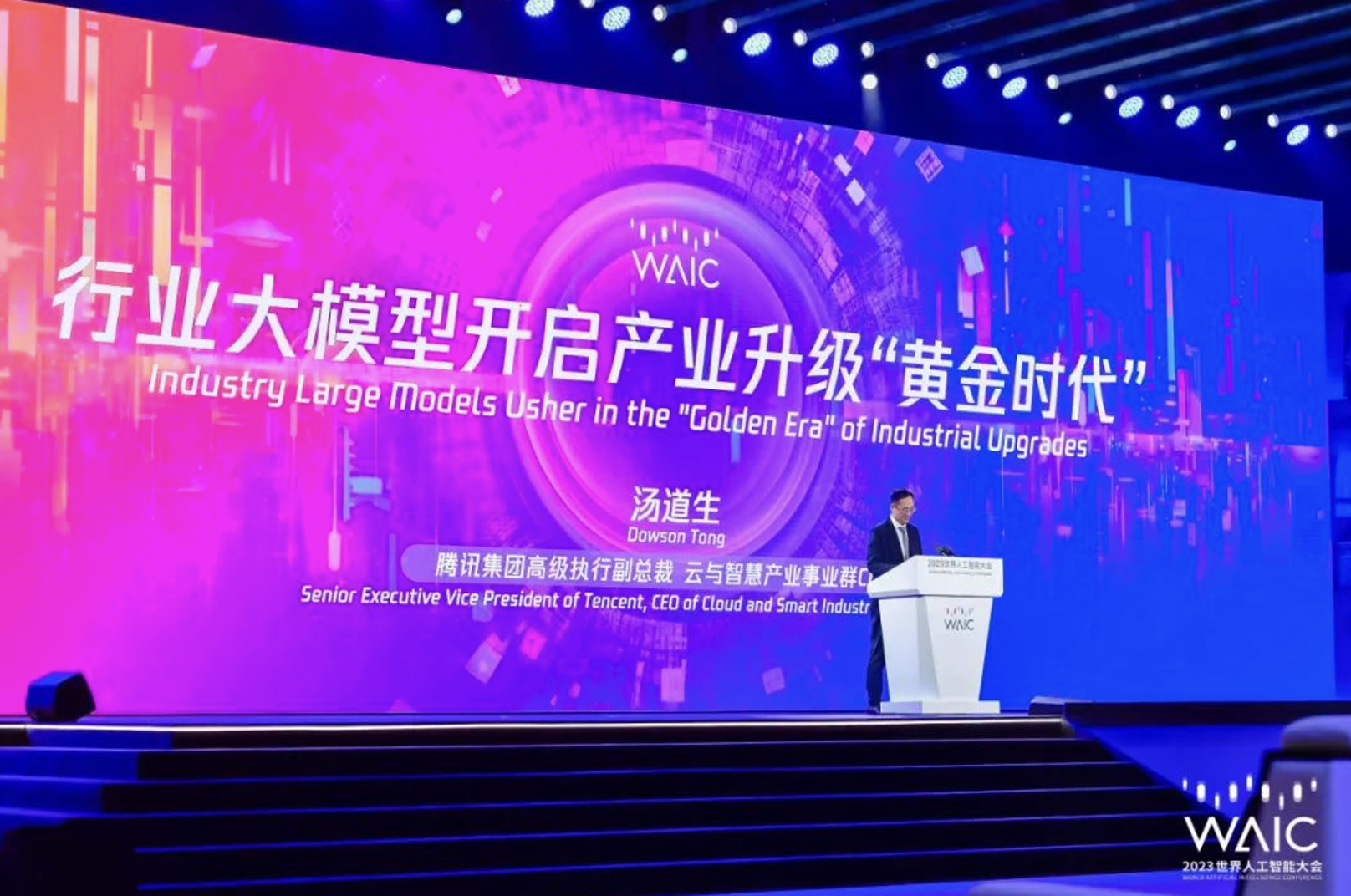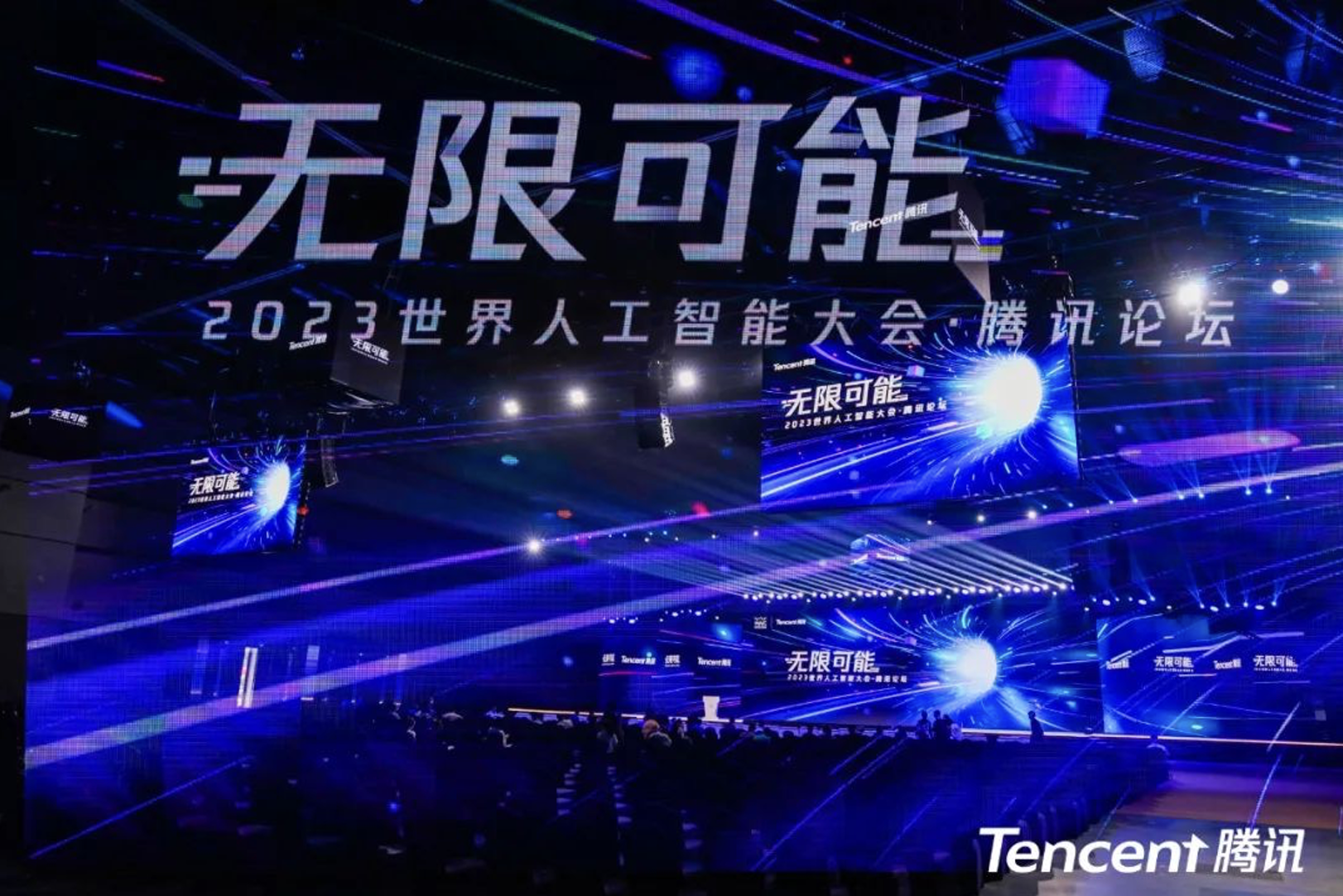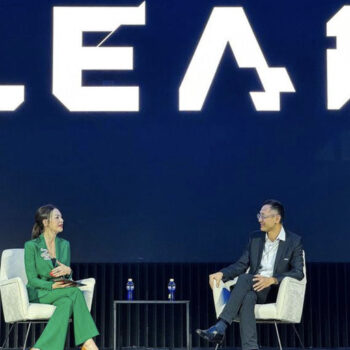Dowson Tong, Tencent Senior Executive Vice President and CEO of Tencent Cloud and Smart Industries Group gave a keynote speech at the World Artificial Intelligence Conference 2023 in Shanghai. Tong emphasized the importance of using powerful AI models specifically designed for different industries, and how high-quality tailored models can unlock the potential of AI for businesses. This is an edited version of the speech and includes previous comments about the benefits of AI.

Over the past five years, remarkable advances in AI technology have been achieved, including significant milestones in learning, output and security. During this time, Tencent has introduced transformative AI technologies and products to various industries.
Our digital smart solutions have seamlessly integrated into more than 130 industries, acting as “digital smart employees” in roles ranging from financial customer service representatives to virtual anchors. Through these solutions, we deliver exceptional and tailored services that cater to the unique needs of our users.
Embracing Large-scale AI Models
To fully benefit from the transformative potential of large models, businesses should consider the following:
- Focus on specific business needs. Build enterprise-exclusive models based on large industry models.
- Maintain service compliance and data privacy. Ensure compliance with regulations and protect data property rights and privacy.
- Ensure quality training data. High-quality data is crucial for effective AI implementation and efficient platform development tools are required.
- Utilize cloud services. Use tools provided by cloud vendors to build integrated model services, reducing the time and costs associated with training, operation and maintenance.

Enhancing the Efficiency with Specialized AI Models
One of the advantages of specialized AI models is their ability to provide precise and efficient services to users. General large-scale models are trained on extensive public literature and online information, which may contain errors and biases. While they can solve up to 80 percent of problems across various scenarios, they often don’t fully meet the specific needs of enterprises.
To address this, enterprises should build their own exclusive models based on large industry models, incorporating professional knowledge and fine-tuning them with their own data. These exclusive models are more efficient, offering tailored and precise services to users. Furthermore, they require fewer resources, making them cost-effective and easier to optimize.
Protecting Data and Ensuring Security
When implementing AI models, it is crucial to protect enterprise data. Data serves as the foundation for large models, and during the training process, it’s important to safeguard core and sensitive data from potential leaks. Large industry models and model development tools provide features such as privatization, authority control and data encryption, allowing enterprises to securely train and deploy models while protecting their valuable data assets.
Efficient Platform Development Tools for Continuous Optimization
Implementing AI models in industries involves a series of interconnected steps, such as data processing, algorithm construction, and model deployment. The application of models doesn’t end with deployment however, and continuous optimization is essential. To streamline this process, efficient platform development tools are required. These tools enable systematic data management, iterative model testing, and continuous optimization, ensuring the smooth operation and effectiveness of AI models.
Introducing Tencent Cloud MaaS Services
To address practical challenges and cater to enterprise needs, we recently launched the Tencent Cloud MaaS (Model as a Service) solution. MaaS, built on the Tencent Cloud TI platform, offers a wide range of large-scale industry models tailored to different sectors, including finance, healthcare, media, and education. By leveraging these capability models, partners can easily create their own exclusive models by adding their own unique scene data. Through privatized deployment, authority control, and data encryption, we prioritize data protection for enterprise users, ensuring secure and reliable model usage.
Two Case Studies
Let me share a couple of success stories to demonstrate the practical benefits of AI models.
One is the collaboration between Tencent and a leading online travel company, where we created a robot customer service based on the “Cultural Tourism Large Model.” By refining the model using industry-specific large models and incorporating enterprise data, the customer service robot delivers accurate and detailed answers. It provides users with comprehensive vacation planning services, including transport, hotels, and even direct booking links. This not only enhances the user experience but also drives sales conversion, benefiting businesses.
Another is the integration of AI models in Tencent Qidian, an advanced CRM solution. By training and fine-tuning the model based on industry-specific large models and combining it with customer production business needs, Qidian’s customer service delivers an accurate, detailed and more humanized user experience. What’s more, the Qidian analysis platform enables sales staff to obtain accurate business insights through natural language queries, eliminating the need for extensive software training and simplifying the process.
Looking Ahead
As we progress in the development of large language models, we’re witnessing a shift from digitization and networking to intelligence in both industries and society. While AI presents tremendous opportunities, we understand the challenges it raises around human development, ethics and education.
We believe, however, that the ultimate goal of artificial intelligence is to serve industries, people and society effectively. Enterprises that can truly address user needs and leverage their proximity to specific scenarios and data will play a pivotal role in the future of large-scale models.
Tencent is committed to collaborating with partners to harness the power of high-quality models and computing capabilities, enabling businesses to unleash the potential of their data and drive industry innovation while simultaneously improving people’s quality of life.





